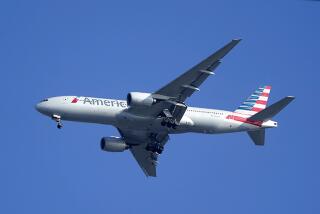Air Fares and Refunds
- Share via
Suppose the price of a plane ticket goes down before you use it? Can you be refunded the difference?
Such refunds depend on the ticket and the amount of the refund, with policies varying among the airlines.
On regular fare tickets, which don’t have restrictions or cancellation penalties, you can get a refund for the difference.
If the ticket was bought through a travel agency, the agency may reissue the ticket. “We first report the sale (to the Airline Reporting Corp.), and when it’s shown as a credit to us, we can make a refund to our client,” said Martha Scott, manager of Glendale Travel.
If the ticket was bought from an airline the carrier would have to be contacted. “If the passenger qualifies for a refund, we would issue a check or process it through a credit card,” said Vince Durocher, director of marketing for Delta Airlines in Los Angeles. “The passenger would have to come to one of our city ticket offices or airport counters.”
Discount fares are another story, because of restrictions and penalties. For example, on a 21-day advance purchase fare you can get a refund more than three weeks before departure. After that the situation can vary.
Contact the Airlines
“If it’s a ticket that has strings attached to it, we have to contact the airline to see whether we can issue a refund or the passenger has to do it through the airline,” Scott said. “Often the consumer can have much better luck than travel agents, especially if they’re ready to scream bloody murder. It’s too bad they have to take that stance, but it can work.”
Full-service travel agencies can go through bookings and tell customers if refunds are possible. “If there has been a big reduction, we go through the reservation cards of ticketed passengers to see if refunds are possible,” Scott said. “Sometimes they can’t get refunds because of the conditions that go with their tickets.”
On some tickets, refunds are compared to cancellation penalties. “By the time you pay the penalty it may not be worth making the change for a lower fare,” said Sue Boucher, manager of Ferguson-Gates Travel in Los Angeles.
There are a couple of other jokers in the refund deck. “Some airlines may offer refunds only if the refund goes over a certain amount,” Boucher said.
United Airlines will refund the difference if the amount is more than $25, according to a carrier spokeswoman. Delta Airlines, however, will refund any amount of the difference in this situation, Durocher said. And TWA has the same policy as Delta.
If travelers buy low-fare tickets based on a seat code such as a Q, and class of service, and the airline then comes out with a lower fare but under a different seat code, nothing may be done. “We have to re-book the passenger in the new code, and if there’s no space available in this new code, the passenger is out any refund and has to fly on the original fare,” Scott said.
Travelers and travel agents alike find fault with this sort of marketing approach. “Why should the traveler be penalized for following the airline’s rules in paying for a ticket by a certain time in advance and then not be able to get a refund on the price difference if a lower fare becomes available?” Scott asked.
Call Your Agent
“When you pay for a ticket, you’re guaranteed what’s on that ticket,” the United spokeswoman said. “If a lower fare comes into your market, call us or your travel agent right away to see if you qualify for any refund. We explain the restrictions of the new fare and we’ll advise you if it’s worth the effort of getting a refund for the price difference.”
What can consumers do? One tactic is to keep an eye on newspaper advertisements for announcements of new air fares. Such fare changes may appear in newspapers even before they emerge on the computerized reservation terminals at most travel agencies, Scott said. Fares most likely to be reduced are discounts geared to leisure travelers.
If you wait and pay for your ticket at the airport, you’ll pay the price in effect at that time, not the price of the reservation. If the price has gone up, you’ll have to pay the higher fare. But if your ticket is already paid for, the airlines won’t hit you for the difference.
“It’s all a gamble, especially with domestic air fares,” Boucher said. “Travelers have to decide whether to buy the ticket now or wait and see if a fare goes down. But once they’re ticketed, they’re stuck with it if it has any sort of penalty.
“Passengers have to make a judgment on whether the airline will stay in business long enough for the ticket to be used, or whether another airline will come out with a lower fare on the same route.”
More to Read
Sign up for The Wild
We’ll help you find the best places to hike, bike and run, as well as the perfect silent spots for meditation and yoga.
You may occasionally receive promotional content from the Los Angeles Times.






